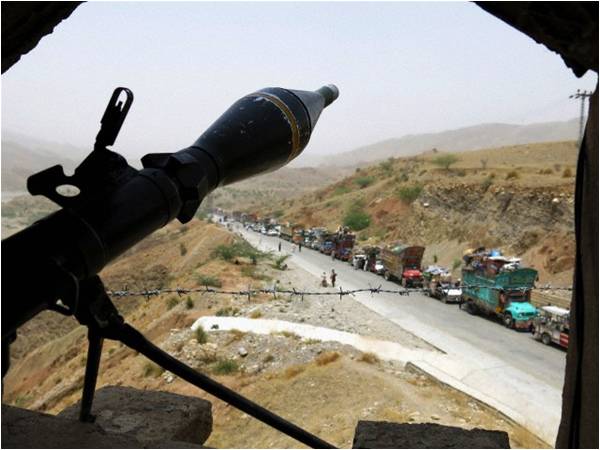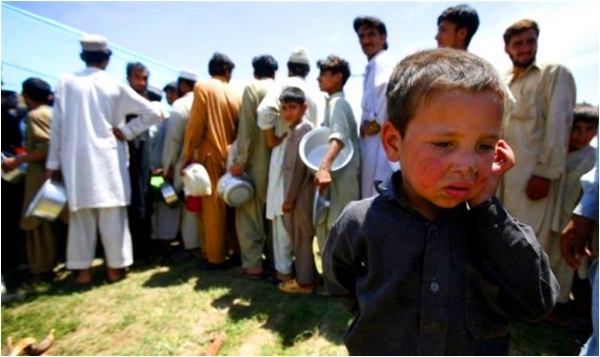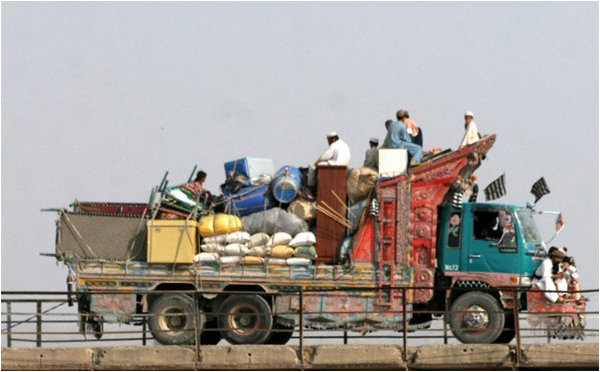
“I’d rather live in my own damaged home than in a camp waiting for compensation and rebuilding,” says Gul Salih Jan, a tribal elder from the war-torn North Waziristan.
One year ago, the military began a decisive operation to rid the area of Taliban, Al Qaeda and other terrorist groups. The locals were asked to leave the area, in order to avoid civilian casualties. The long-awaited operation, codenamed Zarb-e-Azab, rendered 129,486 families homeless, according to the FATA disaster management authority.
The campaign is now being seen as a resounding success. The government claims that the militants have been defeated, and 90 percent of the area is back in its control. “Strongholds, communication infrastructure, (and) sanctuaries (are) largely cleared,” says a recent statement by the military. “So far, 2,763 terrorists (have been) killed (and) 837 hideouts destroyed.” The elimination of terrorist safe havens in the lawless tribal agency also had a positive impact on the security situation in the rest of the country.
Like other Pakistanis, the tribesmen of North Waziristan are happy with the outcome. And they can’t wait to go back home.
Azeemullah Khan, who hails from Mir Ali, says it is tragic that he could not participate in the last rites of his dead relatives in Waziristan. “When someone dies, only one of their relatives is allowed to go to Waziristan,” he says. “The dead are buried by the security forces, and we don’t participate in their last rites.”
But the crisis became an opportunity for Noor Zadin, also from Mir Ali, who moved his restaurant business from North Waziristan to Bannu. He opened an eatery in Bannu similar to the one he ran in his hometown. “Business is better here in Bannu compared with Mir Ali,” he says, and there are no security concerns. “In Waziristan, there were some criminals who often visited my restaurant and ate without paying.”
Like Noor, most tribesmen chose not to live in the camps the government had built for them in Bakakhel. They rented houses in Bannu. But by now, many of them have exhausted their financial resources and are either moving to the camp, or setting up their own private camps.
Noor Sala Jan, a 60 year old tribesman from Issori village of North Waziristan and a father of 10 sons none of whom went to school, says his family has always had financial problems, but moving to Bannu has brought some measure of fortune to the family. “Four of my sons are married, so we have five registered families, therefore we have an adequate amount of food and cash assistance from the government,” he says. “I have never had so much money in my hands before.”
But Ghani Khan, who owned a general store in Mir Ali bazaar, says he has spent all the money he had brought with him. “I can hardly afford to pay rent for another two months. Then we will have to live in a tent.”

Families can be seen living under tents in Bannu, Karak and Lakki Marwat, Dera Ismail Khan and Peshawar.
Having survived the winter, they are now facing a formidable summer. But they don’t want to move to the camp at Bakakhel because of what they call “harsh restrictions”.
On June 21, a quarrel over such restrictions between security officials and a tribesman led to a clash. The tribesmen threw stones at the soldiers, who in turn fired at them. Two tribesmen died while another eight sustained injuries, reports say. The tribesmen threatened to leave the camp in protest, but the government is in talks with a Jirga representing their elders to calm the situation down.
“Ordinary tribesmen cannot abide strict disciplines of the camp,” says Safdar Dawar, a veteran journalist from the tribal areas.
Food and healthcare are certainly their major concerns, but having been displaced for a year, many parents are concerned about their children’s education. Since leaving their homes, more than half of the students are out of school. “There are around 85,000 students amongst the internally displaced persons. Hardly 40% of them are enrolled in schools. The rest have abandoned their studies,” says Malak Gul Saleh Jan. The government had promised it would hold special evening classes in schools for the IDPs, but that did not materialize, he says.
Muhammad Nazir Khan, who represents North Waziristan in the National Assembly, acknowledges that the IDPs are facing “a number of difficulties”, and says government is doing its best to solve these problems. He says they will be sent home soon. “Some 55,000 members of the Edik tribe will be sent to their homes after the completion of their registration,” said the parliamentarian, who won the election as an independent candidate and joined the ruling Pakistan Muslim League-Nawaz.
But the tribesmen say that the government and donor agencies are losing interest in their affairs with the passage of time.
“Politicians and government officials used to visit us regularly, but now they don’t even show up for photographs,” says one of them.

The government had promised Rs 12,000 a month as financial assistance to each displaced family, but they it has given out only six such grants in the last 12 months. The distribution of the seventh grant is underway, it says.
Alam Dawar, a resident of Miranshah, claims that the number of items being distributed among the tribesmen as ration has also been reduced. “We were expecting better rations in Ramadan, but contrary to previous months, this time we received only flour, salt, cooking oil and pulses. No tea, sugar, dry milk, beans, or food supplements for children were included in the ration this month.”
An official in the Fata Disaster Management Authority said that the delay in the distribution of monthly assistance was beyond the authority’s control. “As soon as funding arrives from the federal government, it is immediately distributed amongst the families,” he says.
The repatriation of the displaced families began on March 31, and 734 families have been sent back to their homes in the Shawa and Spinwam towns of North Waziristan. A source in the FATA secretariat says the process has been slowed down by a lack of funds.
One year ago, the military began a decisive operation to rid the area of Taliban, Al Qaeda and other terrorist groups. The locals were asked to leave the area, in order to avoid civilian casualties. The long-awaited operation, codenamed Zarb-e-Azab, rendered 129,486 families homeless, according to the FATA disaster management authority.
The campaign is now being seen as a resounding success. The government claims that the militants have been defeated, and 90 percent of the area is back in its control. “Strongholds, communication infrastructure, (and) sanctuaries (are) largely cleared,” says a recent statement by the military. “So far, 2,763 terrorists (have been) killed (and) 837 hideouts destroyed.” The elimination of terrorist safe havens in the lawless tribal agency also had a positive impact on the security situation in the rest of the country.
Like other Pakistanis, the tribesmen of North Waziristan are happy with the outcome. And they can’t wait to go back home.
Azeemullah Khan, who hails from Mir Ali, says it is tragic that he could not participate in the last rites of his dead relatives in Waziristan. “When someone dies, only one of their relatives is allowed to go to Waziristan,” he says. “The dead are buried by the security forces, and we don’t participate in their last rites.”
"I'd rather live in my own damaged home than in a camp waiting for compensation"
But the crisis became an opportunity for Noor Zadin, also from Mir Ali, who moved his restaurant business from North Waziristan to Bannu. He opened an eatery in Bannu similar to the one he ran in his hometown. “Business is better here in Bannu compared with Mir Ali,” he says, and there are no security concerns. “In Waziristan, there were some criminals who often visited my restaurant and ate without paying.”
Like Noor, most tribesmen chose not to live in the camps the government had built for them in Bakakhel. They rented houses in Bannu. But by now, many of them have exhausted their financial resources and are either moving to the camp, or setting up their own private camps.
Noor Sala Jan, a 60 year old tribesman from Issori village of North Waziristan and a father of 10 sons none of whom went to school, says his family has always had financial problems, but moving to Bannu has brought some measure of fortune to the family. “Four of my sons are married, so we have five registered families, therefore we have an adequate amount of food and cash assistance from the government,” he says. “I have never had so much money in my hands before.”
But Ghani Khan, who owned a general store in Mir Ali bazaar, says he has spent all the money he had brought with him. “I can hardly afford to pay rent for another two months. Then we will have to live in a tent.”

Families can be seen living under tents in Bannu, Karak and Lakki Marwat, Dera Ismail Khan and Peshawar.
Having survived the winter, they are now facing a formidable summer. But they don’t want to move to the camp at Bakakhel because of what they call “harsh restrictions”.
On June 21, a quarrel over such restrictions between security officials and a tribesman led to a clash. The tribesmen threw stones at the soldiers, who in turn fired at them. Two tribesmen died while another eight sustained injuries, reports say. The tribesmen threatened to leave the camp in protest, but the government is in talks with a Jirga representing their elders to calm the situation down.
“Ordinary tribesmen cannot abide strict disciplines of the camp,” says Safdar Dawar, a veteran journalist from the tribal areas.
Only six of the promised monthly grants have been given out in 12 months
Food and healthcare are certainly their major concerns, but having been displaced for a year, many parents are concerned about their children’s education. Since leaving their homes, more than half of the students are out of school. “There are around 85,000 students amongst the internally displaced persons. Hardly 40% of them are enrolled in schools. The rest have abandoned their studies,” says Malak Gul Saleh Jan. The government had promised it would hold special evening classes in schools for the IDPs, but that did not materialize, he says.
Muhammad Nazir Khan, who represents North Waziristan in the National Assembly, acknowledges that the IDPs are facing “a number of difficulties”, and says government is doing its best to solve these problems. He says they will be sent home soon. “Some 55,000 members of the Edik tribe will be sent to their homes after the completion of their registration,” said the parliamentarian, who won the election as an independent candidate and joined the ruling Pakistan Muslim League-Nawaz.
But the tribesmen say that the government and donor agencies are losing interest in their affairs with the passage of time.
“Politicians and government officials used to visit us regularly, but now they don’t even show up for photographs,” says one of them.

The government had promised Rs 12,000 a month as financial assistance to each displaced family, but they it has given out only six such grants in the last 12 months. The distribution of the seventh grant is underway, it says.
Alam Dawar, a resident of Miranshah, claims that the number of items being distributed among the tribesmen as ration has also been reduced. “We were expecting better rations in Ramadan, but contrary to previous months, this time we received only flour, salt, cooking oil and pulses. No tea, sugar, dry milk, beans, or food supplements for children were included in the ration this month.”
An official in the Fata Disaster Management Authority said that the delay in the distribution of monthly assistance was beyond the authority’s control. “As soon as funding arrives from the federal government, it is immediately distributed amongst the families,” he says.
The repatriation of the displaced families began on March 31, and 734 families have been sent back to their homes in the Shawa and Spinwam towns of North Waziristan. A source in the FATA secretariat says the process has been slowed down by a lack of funds.

